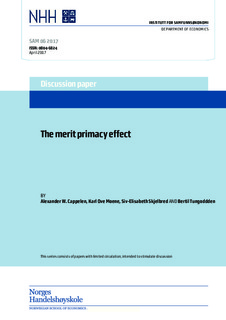| dc.contributor.author | Cappelen, Alexander W. | |
| dc.contributor.author | Moene, Karl Ove | |
| dc.contributor.author | Skjelbred, Siv-Elisabeth | |
| dc.contributor.author | Tungodden, Bertil | |
| dc.date.accessioned | 2017-05-04T13:46:13Z | |
| dc.date.available | 2017-05-04T13:46:13Z | |
| dc.date.issued | 2017 | |
| dc.identifier.issn | 0804-6824 | |
| dc.identifier.uri | http://hdl.handle.net/11250/2441688 | |
| dc.description.abstract | Do people give primacy to merit when luck partly determines earnings? This paper reports from a novel experiment where third-party spectators have to decide whether to redistribute from a high-earner to a low-earner in cases where earnings are determined by luck and merit. The experiment has four treatments that vary the relative importance of luck and merit, but where it is always possible to decompose the part of the earnings that originate from each of the two sources. We argue that any reasonable fairness view in such cases should satisfy two fairness conditions: Fairness Consistency and Fairness Symmetry. Our main finding is that the spectators assign strong primacy to merit in situations where inequalities are due to both luck and merit, and as a result violate both fairness conditions. The spectators allocate close to the same share to the high-earner when meritonly accounts for ten percent of the earnings as when merit accounts for all of the earnings, and paradoxically spectators allocate even more to the high-earner when luck determines a small part of the earnings. We believe that the results shed new light on inequality acceptance in society, in particular by showing how just a little bit of merit can make people significantly more inequality accepting. | nb_NO |
| dc.language.iso | eng | nb_NO |
| dc.publisher | Institutt for samfunnsøkonomi, NHH | nb_NO |
| dc.relation.ispartofseries | DP SAM;6/2017 | |
| dc.title | The merit primacy effect | nb_NO |
| dc.type | Working paper | nb_NO |
| dc.subject.nsi | VDP::Samfunnsvitenskap: 200 | nb_NO |
| dc.source.pagenumber | 30 | nb_NO |
